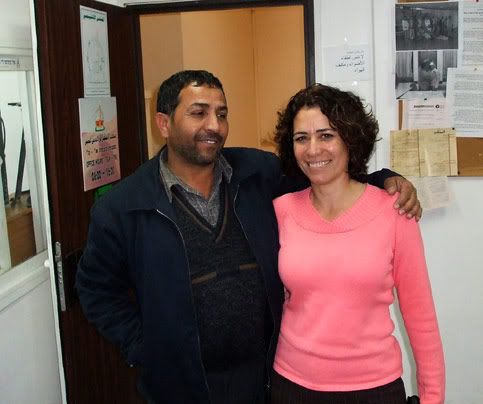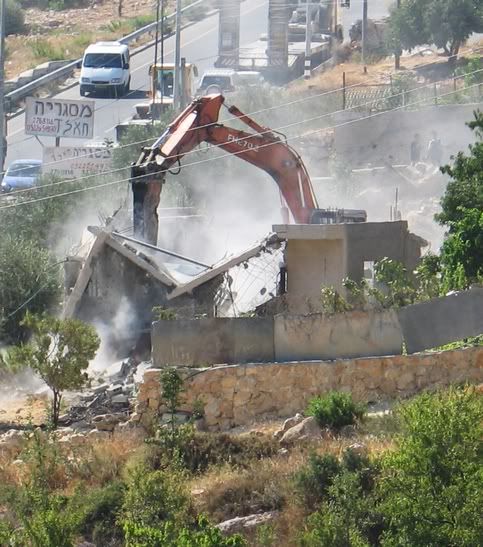
Yeela Raanan with Bedouin citizen
Yeela Raanan was born and brought up in the Israeli Negev. She spent a year (eighth grade) in W. Sussex England during her father’s Sabbatical year in 1978 and studied for her PHD in anthropology in Utah, where she lived with her family for ten years. Returning to Israel after her studies, Yeela worked as the coordinator for the Negev Coexistence Forum, a Jewish-Arab organization based in the Negev. She left the organization to join the Regional Council for the Unrecognized (Bedouin) Villages (RCUV) where she has been righting for Bedouin rights ever since. She lives with her family which includes three teen aged sons in Kibbutz Beeri.
As part of Israel’s recent clamp down on civil and human rights organizations in Israel and the Palestinian territories, it was announced yesterday that Yeela Raanan was indicted for nonviolent protest of a house demolition. She explains,
April 13, 2010
The Government of Israel is putting me on trial next week (Monday, April 19th, 11:00am in Beer Sheva): for expressing my displeasure at the brutal home demolitions in the Unrecognized Bedouin Villages. The government and its acting bodies do not want any resistance to the implementation of their racist policies, and therefore wish to scare and intimidate those who speak out.
For 60 years the Government of Israel is denying the right of the indigenous people of our desert: the access to resources, to their livelihood, their sources of dignity – and to a roof over their heads.
It has been denying access to building permits from 80,000 of its citizens. Without access to building permits, each home built is deemed “illegal”, and hundreds are demolished every year. At times entire villages are razed to the ground. All demolition orders written are using the excuse of the law, a law that is written and implemented to give privileges to the Jewish majority – almost all of whom, including myself, are survivors of victims of such laws in other far-away countries.
I grew up in Arad, a town built among the Bedouin, to make sure that the Jews become the rulers of this space. It took me many years to realize that the Bedouin I saw every time I left my hometown are not part of nature, like the rocks and the wadis. It was not my education that had opened my eyes, a good Zionist education, teaching me to be part of a dream of redeeming the land. It was despite this education.
But once the blinds were lifted, it started hurting. I saw the pain in the injustice, in the ongoing feeling of my neighbors, now turned friends, of being treated as deserving less, as a bother to the natural development of our region – the Negev. Every baby born – a “demographic threat”, every time a home is built, economic stability achieved – it is seen as a menace in the only country they can call home.
I completed a PhD, with the aim of sounding louder. It has since been a privilege to work with the Regional Council for the Unrecognized Bedouin Villages (RCUV), an organization of the leadership of the Unrecognized Villages, created against all odds, to struggle for the rights of the villagers, utilizing all democratic means available. Since its creation in 1997 the Government of Israel has seen it as a major threat, as it has the potential of exposing the secret of the horrific policies towards the Bedouin to the world, and maybe forcing Israel to some measure of justice towards this long-suffering minority. It has the potential of exposing the lies Israel likes spreading: “They have no leadership; they do not know what they want…” It also has the potential of organizing the resistance of a broken and oppressed minority.
Home demolitions are by far the most vicious of the policies towards the Bedouin villagers. It is hard to describe the pain, if you have not witnessed it up close. But do try and imagine: hundreds of well armored police dressed in black uniforms forcefully emptying your home of your family, your children, your husband being made helpless to protect his family in their own home, the rest of the villagers looking on with fear and horror, any one that dares to show any resistance is immediately arrested, to be later prosecuted for “Arab attacking police”.
Then the bulldozers. Most homes are made of tin, it takes about 3 minutes, and the only place that a woman and her family could feel safe in, is no more; brutally razed to the ground in front of men, women and children.
And all the government sponsored rhetoric on “illegal buildings” and “trespassers on government land” cannot erase the truth: it is a means of forcing the Bedouin to give up the last of their lands. Israel has taken from them already 97% of the Negev, the home demolitions are to secure the last 3%.
Two years ago while drinking my morning coffee at home, less than two miles away from the Gaza border, we heard unusual shots on the border. An hour later we heard that a Bedouin soldier was killed, in a clash with Palestinians that had attempted to enter Israel. He had been killed protecting my family. Arriving at work I heard that the government, despite this loss to the Bedouin community, is out demolishing homes.
I arrived as part of the RCUV at the scene of a home demolition in the unrecognized village of A-Shahabi a few minutes before the bulldozers. Knowing full-well that I cannot stop the demolition – I sat in the house to give voice to the injustice of these demolitions, to the discriminatory, brutal and harmful policies. It was a peaceful, non-violent protest, sitting alone in a house with the bulldozer at the wall. As expected I was taken out by the police, and then I was arrested.
By the way – the soldier who was killed had a demolition order on his home.
The commander of the police station was angry, he shouted at me, “The last thing we need is for Jews to join the struggle of the Bedouin…” And it is to frighten us so we stay away from working towards justice in our country, that I am being put on trial next week.
Raise your voice! Against the home demolitions, against the non-recognition of the villages and the ownership of the ancestral lands, and against the silencing of criticism of racist policies.
Yeela’s story is another example of ethnocracy gone awry.




Here’s how you can help:
· Join us on Monday at 10:30am standing together before the courts in Beer Sheva, and join us inside the courtroom at 11:00, to show that we stand united in our quest for real democracy.
· Write! To the Attorney General, Yehuda Weinstein. Demand that his office stop the persecution of civil rights activists, and the censure of political criticism through the court system.
Address: 29 Salah A-Din St., Jerusalem. 91010; tel: 02-6466521/2; fax: 02-6467001.
· To the Minister of Public Security, Isaac Aharonovitch, in charge of the police. Demand that the police cease from using its power to crush political criticism.
Tel: 02-5428500; fax: 02-5428039
· To Yehuda Bahar, director of the New Authority for the Regulation of Bedouin Settlement. He is in charge of implementing the governmental policies. Demand that he begin implementing just policies, policies that recognize the historical rights of the Bedouin, instead of brutal home demolitions and policies of oppression and subjugation.
Tel: 08-6263722; fax: 08-6263719; email: yehudab@moch.gov.il
· Help pay for the expenses! One of the aims of taking people like me to court is to make it expensive to express our opinions. Lawyers’ expenses are high. You can send a check directly to Adv. Gabi Laski, 18 Ben Avigdor St. P.O.Box 57092, Tel Aviv, 61570. ISRAEL (please let me know). You can also use my paypal account, associated with the email yallylivnat@gmail.com .